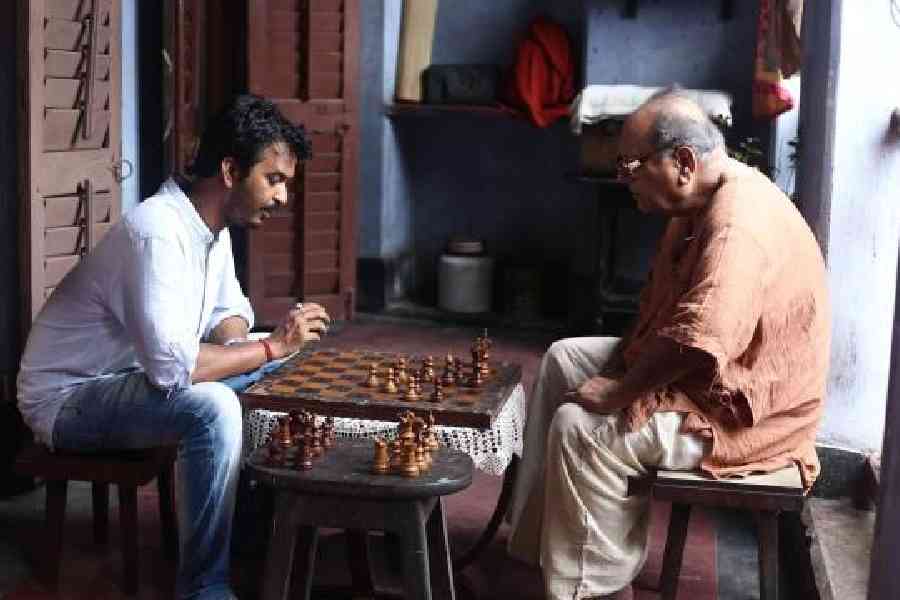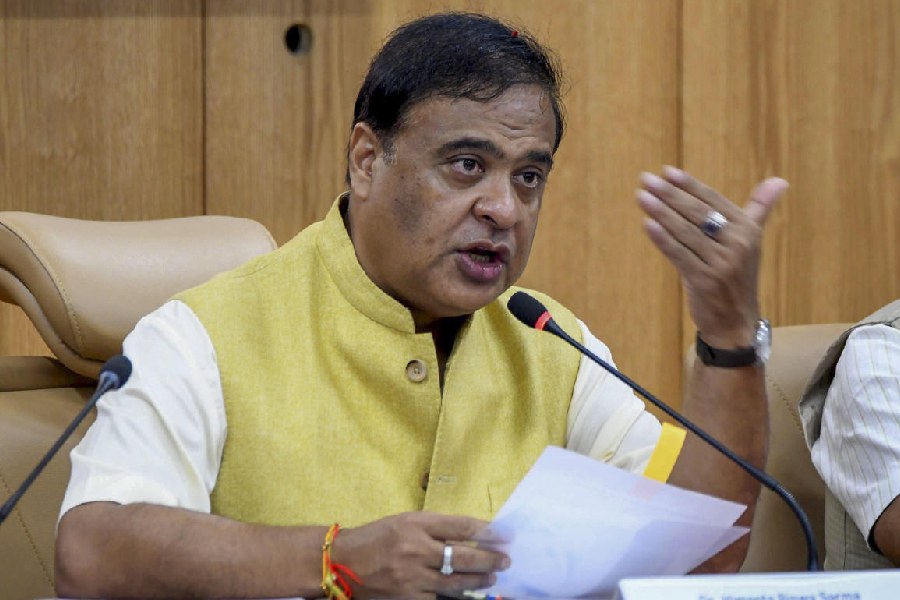The May 10 film Dabaru tells the story of Calcutta boy Surya Sekhar Ganguly’s journey of becoming a Grandmaster in chess. Directed by Pathikrit Basu, presented by Nandita Roy and Sanjay Agarwal and with creative direction by Shiboprosad Mukherjee, the film — a blend of slice-of-life and sports drama — features an ensemble cast. Surya Sekhar Ganguly, who became a Grandmaster at the age of 19, is an inspiration to many. A t2 chat with director Pathikrit Basu...
What inspired you to do a film on Grandmaster Surya Sekhar’s life?
I was supposed to do another film with Windows. That couldn’t be done for some reason and then this script came to me from Windows. When I read Surya’s script, it felt very interesting to me. After that, I went to his house. That’s where apart from his success in chess, I could visualise a story of someone’s life. This is a story of fulfilling dreams and achieving success in life. It is not about starting from zero but from negative and then going somewhere.
His father was an astrologer but since he couldn’t tell lies, he had to lose his job. In his house, there was no income. So, when people don’t know what they will eat tomorrow... from there to becoming a Grandmaster is a far-fetched dream. When Surya started playing, he became the sole earning member of the family. Then he tried to go outside for a tournament. He would ask people for sponsorships but he was mocked and told, ‘Today people are asking money for chess; tomorrow people will come asking money for playing ludo.’ Being a Grandmaster in his situation was next to impossible.
Did you have any experience in this game?
I have played the kind of chess that people play at home. But when I went to Surya, I saw that it was a different game. Surya said that in 99 per cent of the cases, the move that people expect is always the opposite of what is played. It is unpredictable just like life. When he explained chess to me, it felt like life. At one point in the film, where Chiranjeet (Chakraborty) is seen as a coach, chess felt like life to me. The philosophy of the game and the philosophy of life felt very similar. I made sure it was not entirely about the game or not entirely about life. While making the film, I wanted to make sure it is a complete package. There is drama, it is a story of a helpless mother, a story of a grandfather seeing dreams through his grandson’s ability to play the game, it is the story of a coach’s sacrifice, and there is romance and comedy. Plus, there is a game. When I started understanding the game better, I used to go to Gariahat and observe. The game is played there under the bridge, on the road. When people watch the film, those who don’t know the game will also like the film as they will witness a story of dream fulfilment, whereas, for those who know the game, it will be a delight for them to watch the significance we showed. For example, in one scene Chiranjeet playing the coach signifies the role of the horse on a chessboard, Ritudi’s (Rituparna Sengupta) story signifies the move of a queen. The moves on a chessboard are completely integrated into the story that is unfolding on screen.
There is a scene in the trailer where little Surya is playing chess with his mother on their home’s chequered floor. Were these very consciously incorporated?
There was a time in his life when even in his subconscious mind, he would be playing the game all the time. We tried to show that through some scenes.
How did you choose the cast of the film?
The year ’88 is one backdrop in the film and ’90s is another backdrop. So, it was a conscious choice to create nostalgia with the casting as well. That is why I incorporated superstars of the ’90s. Ritudi, Chiranjeetda, Deepankar De and Shankarda all of them were working in full swing in the ’90s. So, I have tried to keep that nostalgic aspect. Choosing the kids was really difficult. There was no school that I didn’t visit. They were very cooperative. We chose the kids from three different schools and then groomed them. Deepankarda even at this age is extremely punctual. On the first day, he arrived on the set before me. Ritudi can do anything for a film. We shot our climax in Chennai. Till 6pm, she did not eat that day. Her dedication is of a different level. Chiranjeetda always stays in a thinking mode. When we used to do any scene, he would sit quietly and think. He would call me and make suggestions about the dramatic aspects of that scene. He helped me a lot in his scenes. Other actors like Sanghasri, Biswanathda, Koushik Sen and Shankarda were also terrific.
Your protagonist has many significant incidents in his life. How did you choose which ones to focus on?
When we listened to the story from him on the first day, we decided that we would cover his life till he became a Grandmaster. He has many achievements even after that. I am really grateful that eight chess players, including Viswanathan Anand and Gukesh D were present at our poster launch. Anand is also very excited about this film. He had seen Ritudi and told me that behind every chess player there’s a mother’s fight.
What were your challenges in this shoot?
Doing this film was very difficult. Firstly, there is chess; then there is a small kid and there are actors like Ritudi, Chiranjeetda and Deepankarda. The entire film was shot in real location, in the North Calcutta lanes. Everyone cooperated. There was a different team that handled the chess moves for us. There is a scene where Surya plays chess on 16 boards and all 16 boards are technically correct in the film. Surya’s assistants were with us and they used to check all the moves. Interlinking scenes with the game of chess made the shooting even more challenging. In all their dialogues, there’s a chess move involved. All that was coordinated by his team. There’s a reference to Sultan Khan’s moves as well.
We have so many Grandmasters in chess in Bengal but still, the game is not glorified as much as cricket or football. Did you also want to highlight that through your film?
Now things are different and people’s interest in this sport has increased. When I was working on the film, I had experiences where a boy gets up in between the game and goes to buy a water bottle saying that the game is over and it so happens that after 15 moves, he says checkmate. He was able to see the game 15 moves ahead. Surya probably can see over 100 moves. There’s a dialogue in the film that says it is a game of the kings. It is an elite game so it was not so popular amongst general people earlier. People wish that someone from their house would also be a Surya but aren’t aware of the struggle involved. In cricket, even if one gets a chance in Under 19, we go and click a selfie with them. But even though this state has given so many Grandmasters, we don’t speak as much about them. We, as makers, feel that after this film, people will go and want to take a selfie with a Grandmaster as well.
How much do Shiboprosad Mukherjee and Nandita Roy as producers get involved in the film?
They were very involved at the script level. I sat with them many times. Shibuda is a very good dialogue writer. He makes it colloquial so beautifully. This has been a journey of almost two years.
You started your journey with Windows and now you are making a film under their banner. Is the film somewhere your story too?
I started my journey being hand-held by Shibuda and Nanditadi. I did other films in between but have always wanted to work with them. This time everything worked out, and definitely, for me, the making of this film is a dream fulfillment. In today’s time, I don’t make films unless I can relate to the story myself. I could relate to Dev’s character in Kacher Manush. In Surya Sekhar’s life, if I take the chess away, I can relate to the struggle. I don’t believe in a film unless I can relate.
What kind of stories would you want to tell as a contemporary director going forward?
Dabaru is an unusual content. Leaving aside football and cricket in the genre of sports drama, there was only one film called Koni. If this film gets people’s support then there are many more unusual stories that people don’t know of. I will be able to narrate those through my films.










